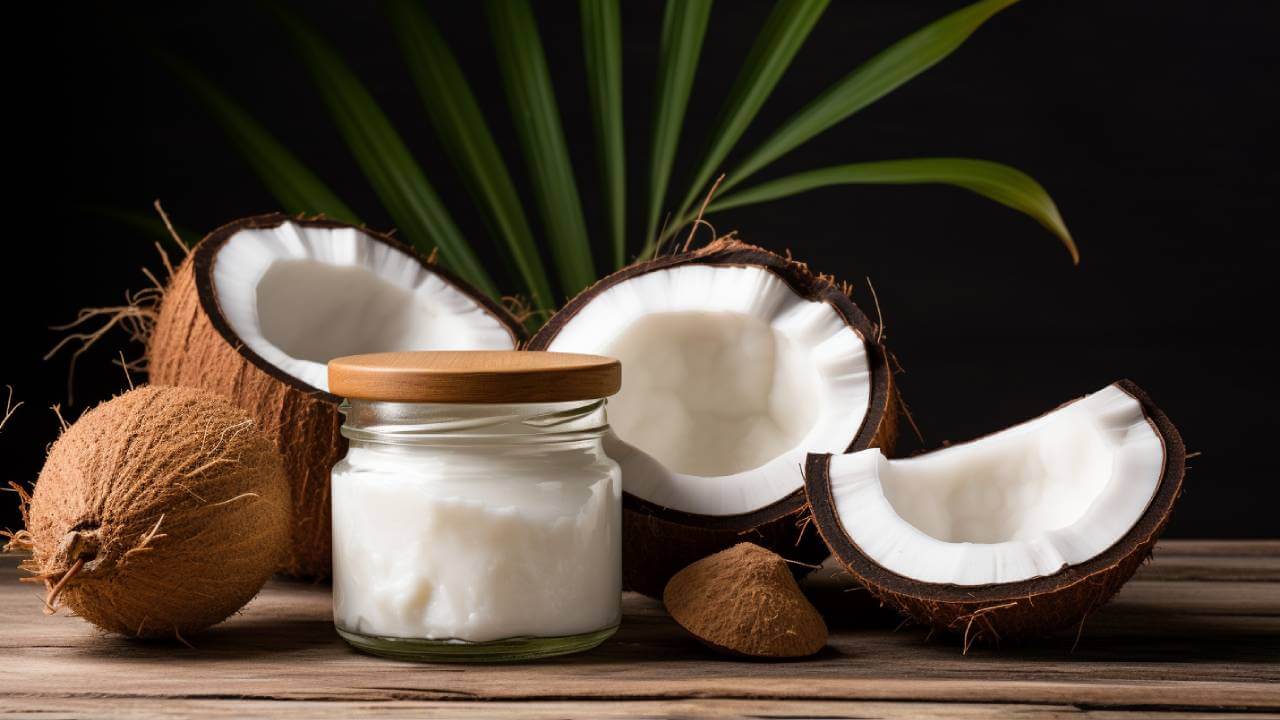Once primarily a human health staple, coconut oil has garnered significant attention for its versatility as a natural remedy for many dog health issues. As pet owners increasingly turn to holistic approaches to enhance their furry companions’ well-being, discussions have begun to discuss the benefits of coconut oil.
To understand why coconut oil is gaining popularity among pet owners, let’s examine its scientific composition and potential positive effects on canine health.
The Science Behind Coconut Oil
Think of coconut oil as a wellness wizard for your dog. Inside that unassuming jar lies a secret mix of goodness that can amp up your pup’s health. Coconut oil boasts MCTs and special fats like quick energy shots for your dog. They need to fill them up. They fuel them for playtime and adventures.
Then there’s lauric acid, the superhero in coconut oil. It battles bad guys like bacteria and viruses, boosting your dog’s immune system and helping them stay healthy.
“As far as I know, coconut oil’s benefits have not been proven; it might or may not work. Go slow, go low. Be careful with potential GI upset, pancreatitis, etc.” – Veterinarian Mykhailo Ozmenchuk.
And the surprises keep coming. Coconut oil fights inflammation, making it a life-changer for dogs with joint discomfort or those senior snugglers.
What Are the Benefits of Using Coconut Oil for My Dog?
Using coconut oil for your dog can offer a variety of health and cosmetic benefits due to its unique composition of fatty acids, primarily medium-chain triglycerides (MCTs). Here are some of the notable benefits:
- It improves skin health: Coconut oil can help soothe dry skin, reduce allergic reactions, and improve overall skin health. Its moisturizing properties can also alleviate itchy skin and dandruff, making your dog’s coat appear smoother and more lustrous.
- Coconut oil enhances coat condition: Regular topical application or dietary inclusion of coconut oil can make your dog’s coat shinier and softer. It can also help in detangling hair, making grooming easier.
- Promotes digestive health: When added to your dog’s diet, coconut oil can aid digestion and nutrient absorption. It can also help combat digestion-related issues such as inflammatory bowel syndrome and colitis.
- The oil boosts the immune system: Coconut oil’s lauric acid has antibacterial, antiviral, and antifungal properties, which can help strengthen your dog’s immune system and potentially ward off infections.
- Oil from the coconut improves metabolic function: Coconut oil’s MCTs can enhance energy levels and help with weight management by increasing metabolism. This can be particularly beneficial for overweight dogs.
- It supports oral health: Coconut oil can help improve your dog’s oral health by reducing bad breath and decreasing the build-up of plaque and tartar. Some pet owners use it as a natural toothpaste.
To avoid the potential health risks and benefits associated with dietary changes, securing dog insurance can provide peace of mind by covering unexpected vet visits and treatments.
Always consult your veterinarian before making significant changes to your dog’s diet or care routine, particularly if your dog has a history of pancreatitis or is overweight, as coconut oil is high in calories and fat.
For more insights into how coconut oil and other natural remedies can support your dog’s health, explore The Power of the Coconut – Breakthroughs to Support Dogs.

Add Coconut Oil To Meals and Treats
Incorporating coconut oil into your dog’s meals and treats can be a delightful and healthy addition to their diet. Here’s how to seamlessly blend this superfood into their daily routine, ensuring they reap all its benefits while enjoying every bite.
If it’s your first time adding coconut oil to your dog’s diet, begin with just a quarter teaspoon for smaller dogs and up to one teaspoon for larger breeds. This gradual introduction helps their system adjust without causing digestive upset.
Mixing coconut oil into your dog’s food is the simplest way to include it in their diet. Whether you’re feeding dry kibble, wet food, or homemade meals, stirring in the coconut oil ensures your dog won’t miss out on its healthful properties. The oil’s subtle, appealing taste is often well-received by canine palates, making mealtime even more enticing ✨
Need to know: Another innovative way to add coconut oil to your dog’s diet is using it in frozen treats. Mixing coconut oil with pureed pumpkin, mashed banana, or peanut butter and then freezing it in ice cube trays or silicone molds offers a refreshing and healthy snack, especially during warmer months.
Remember, while coconut oil is beneficial, moderation is crucial. Too much can lead to weight gain or digestive issues. Adjust the amount based on your dog’s size, activity level, and overall health. While exploring dietary additions like coconut oil, it’s crucial to understand other foods’ safety. Learn more about what your dog can and cannot eat, such as if your dog can eat raw hamburger meat.
How Do I Choose a Coconut Oil for My Dog?
Choosing the right coconut oil for your dog involves considering a few key factors to ensure you’re giving them a high-quality product that’s safe and beneficial. Here are some steps to help you select the best coconut oil for your furry friend:
1. Opt for Virgin or Extra Virgin Coconut Oil
Virgin or extra virgin coconut oil is extracted from fresh coconut meat without high temperatures or chemicals, preserving its natural nutrients, especially its medium-chain triglycerides (MCTs). This type of oil retains more beneficial compounds for your dog.
2. Look for Organic Certification
Organic coconut oil comes from coconuts grown without synthetic pesticides or fertilizers. Choosing an organic option ensures you’re avoiding potential toxins and providing a cleaner product for your dog.
3. Cold-Pressed is Preferable
Cold-pressed coconut oil is made by pressing the coconut meat at cool temperatures. This process retains more antioxidants and nutrients than refined oils, making it a healthier choice for your dog. It’s also more flavorful, which your dog might appreciate.
4. Check for Unrefined
Unrefined coconut oil, also known as virgin or extra virgin, is processed without bleach or other chemicals. It keeps the oil to its natural state, ensuring your dog gets all the beneficial fatty acids and antioxidants.
5. Avoid Refined Coconut Oil for Regular Use
Refined coconut oil might be suitable for occasional topical use, but it’s best to stick with virgin or extra virgin for dietary supplementation. Refined oil undergoes more processing, which can strip away some of the natural nutrients and sometimes include chemical residues.
Understand the broader impacts of dietary fat sources on your dog’s health and abilities, including a fascinating study on the effect of dietary fat sources and exercise on the odorant-detecting ability of canine athletes.
6. Liquid Vs. Solid Form
Coconut oil is solid at room temperature but melts at about 76 degrees Fahrenheit (24 degrees Celsius). The form doesn’t affect its quality, but liquid coconut oil (often called fractionated coconut oil) has removed the long-chain fatty acids. For dietary use, stick with the solid form that melts, as it retains the full range of beneficial MCTs.
Coconut oil is a human kitchen staple and a valuable addition to your dog’s wellness routine. Its science-backed benefits, from enhancing digestion to promoting healthy skin and fur, make it a must-have in your pet care arsenal. Consult your veterinarian before introducing any new supplement to your dog’s diet;

FAQs
Can coconut oil help with my dog’s itchy skin?
Yes, coconut oil can benefit dogs with itchy skin due to its moisturizing properties. When applied topically, it can soothe dryness and reduce irritation. However, it’s important to identify the underlying cause of the itchiness with a vet, as coconut oil may not be suitable for all skin conditions.
How often should I apply coconut oil to my dog’s coat?
Applying coconut oil once or twice weekly is sufficient for general coat health. If you’re targeting specific issues like dry skin or coat dullness, consult your vet for a tailored regimen that won’t disrupt your dog’s natural skin balance.
Is there a difference between cooking coconut oil and the type used for dogs?
The coconut oil you use for cooking and the one you apply on your dog can be the same, provided it’s virgin and unrefined. This type retains more of its natural beneficial properties. Always opt for high-quality, organic coconut oil to ensure it’s free from harmful chemicals.
Discover the benefits and guidelines for a Home-Cooked Diet Supplemented with Coconut Oil, offering a nutritious alternative to store-bought dog food.
Can coconut oil help my dog’s bad breath?
Coconut oil has antimicrobial properties that can help improve your dog’s oral health and potentially reduce bad breath. Introducing a small amount into their diet or brushing their teeth can help control harmful bacteria.
Are there any dogs that shouldn’t use coconut oil?
While coconut oil is safe for many dogs, those with pancreatitis or specific allergies should avoid it. High in fat, coconut oil can exacerbate certain conditions, so it’s crucial to consult your vet before introducing it to your dog’s diet or skincare routine. For a guide on using this natural oil for various canine conditions, check Coconut Oil for Dogs and How to Relieve a Dog’s With a Natural Oil Like Coconut.






0 Comments